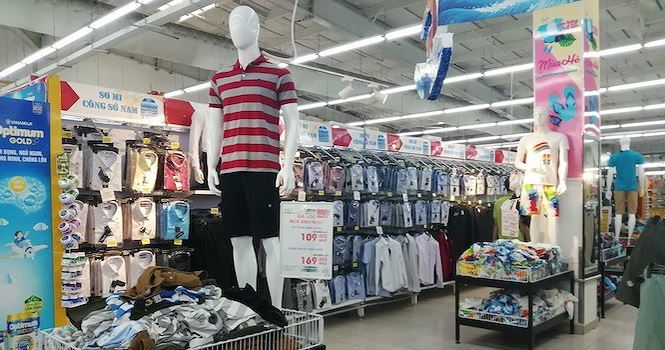Big C on July 2 unexpectedly announced it will stop collecting garment products from suppliers in Vietnam on July 3.

On July 3, nearly 100 garment suppliers gathered in front of Central Group Vietnam, the Thai investor that owns Big C, with banners to protest the policy.
Later, Big C issued a press release, saying that it is considering 4,000 Vietnamese goods suppliers, including 200 garment suppliers, as part of a plan to restructure and develop new brands.
Phan V. Dang, a representative of a garment company, said Big C did not ‘played fair’ when announcing the new policy unexpectedly and then implementing the policy the next day.
“We cannot force them to sign contracts with us and continue to buy our goods. However, they must inform us about the new policy three months in advance,” he said.
|
Later, Big C issued a press release, saying that it is considering 4,000 Vietnamese goods suppliers, including 200 garment suppliers, as part of a plan to restructure and develop new brands. |
“In June, when the old contract terminated, the retailer contacted us, negotiated and placed new orders. We had begun implementing the new orders. But they (Big C) suddenly stopped the contract,” he said.
He cited a law as saying that retailers must not refuse to import goods from suppliers when there is no good reason.
A businessman from a garment company in Binh Tan district said that Big C stopped collecting goods from his company though the contract on supplying goods was extended.
“They (Big C) need to bring Thai goods to Vietnam to sell with Vietnamese goods. But if they remove Vietnamese products to make room to display foreign products, they obviously are playing unfairly,” he said.
In fact, the businessman commented, retailers can use many different types of ‘weapons’ to oust Vietnamese goods from their chains.
“if retailers set high required discount rates, suppliers will have to unilaterally say goodbye,” he said.
In 2016, Big C unexpectedly raised the required discount rate on products sold at the supermarket chain by 4.25-5.5 percent to 17-25 percent.
What is happening at Big C has raised concern that the foreign-owned supermarket is step by step dislodging Vietnamese goods from supermarket shelves.
Do Hoa from Tinh Hoa Quan Tri, a consultancy firm, said that once Vietnamese goods no longer appear at Big C, MM Mega Market and other large retail chains, Vietnamese enterprises will not only lose considerable revenue, but also lose brand value. When products are available at large supermarkets, not just at traditional markets, they bring higher prestige.
He warned that if the retail sector is controlled by foreigners, Vietnam’s production will lose the home market.
Ha Dung

Textile and garment industry sees great opportunities in EVFTA
A number of industries that make products for export, including textiles and garments, are expected to change for the better if they can take full advantage of the value chain from EVFTA.

Vietnam’s textile industry strives to find new markets
Vietnam’s textile and garment industry is striving to achieve export turnover of more than US$40 billion in 2019, a year-on-year increase of 14-15 per cent.
 If Vietnamese products are absent from large retail chains, domestic production will lose advantages in the home market, experts warn.
If Vietnamese products are absent from large retail chains, domestic production will lose advantages in the home market, experts warn.